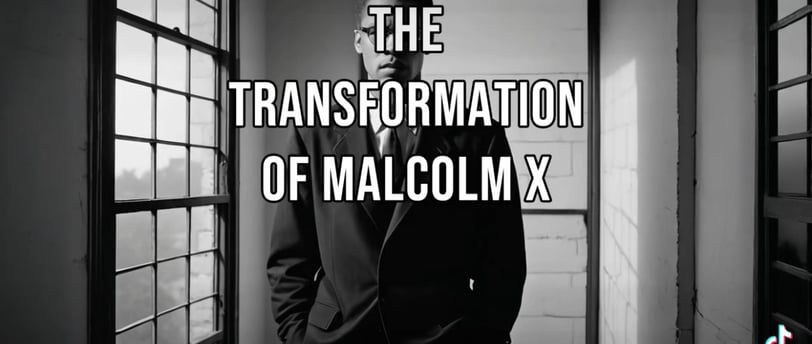The Revolutionary Journey of Malcolm X
Discover the transformative journey of Malcolm X, a figure whose life story is more relevant today than ever. What if understanding his experiences could redefine how we approach systemic change and equality? This episode promises to unravel the complexities of Malcolm's early life, marked by profound personal loss and the harsh realities of racism, setting the stage for his influential role in the civil rights movement. Through his powerful speeches and unwavering belief in black empowerment, Malcolm X challenged the status quo, making him both a revered and radical icon who ultimately found common ground with Martin Luther King Jr. on the need for systemic reform.
Footprints In The Dark
10/18/20242 min read


In this compelling podcast episode, we take a deep dive into the life and legacy of Malcolm X, a civil rights icon whose influence is as pertinent today as it was during his lifetime. Malcolm X's journey from a tumultuous childhood to becoming a powerful advocate for black empowerment is a story of resilience and transformation.
Born Malcolm Little, his early life was marked by profound personal loss and the harsh realities of systemic racism, which set the stage for his future role as a pivotal figure in the civil rights movement.<br><br>The episode begins by examining Malcolm X's early years, which were heavily influenced by his father's activism and tragic death. His father's support for Marcus Garvey and the principles of black self-determination left an indelible mark on young Malcolm.
However, the loss of his father under suspicious circumstances, coupled with the family's subsequent hardships, added layers of instability and adversity to his upbringing. These experiences ingrained a deep sense of injustice in Malcolm, a theme that would become central to his life's work.Malcolm's encounter with the Nation of Islam (NOI) during his prison years was a turning point.
The NOI's message of black empowerment and self-reliance resonated deeply with him, offering a sense of community and purpose that had been missing in his life. This period of self-education and reflection was pivotal in shaping Malcolm into the formidable speaker and thinker he became. By adopting the name Malcolm X, he rejected the "slave name" imposed by a system designed to oppress, making a powerful statement about identity and self-determination.
Throughout his career, Malcolm X was unafraid to challenge the status quo, calling out the systemic nature of racism in America. His critiques of racial injustice were sharp and unyielding, emphasizing the need for economic and political control within black communities. He argued that true liberation required more than just equality on paper; it demanded empowerment and the ability to shape one's destiny free from systemic constraints.
One of the most intriguing aspects of Malcolm X's journey was his evolving perspective, particularly towards the end of his life. A pilgrimage to Mecca in 1964 reshaped his worldview, leading him to embrace Sunni Islam and adopt the name El-Hajj Malik El-Shabazz. This experience broadened his understanding of race and religion, highlighting the universality of Islam and the potential for unity beyond racial divides. This transformation opened him up to dialogue and collaboration with white activists and positioned the struggle for black liberation as part of a larger global movement for human rights
Despite his radical reputation, Malcolm X's ideas began to align more closely with those of Martin Luther King Jr., recognizing the need for systemic change to achieve true equality. His willingness to evolve and challenge his own beliefs is a testament to his character and an enduring lesson for all. Malcolm's legacy extends beyond the Black Power movement, influencing education, the arts, and anti-colonial movements worldwide. His autobiography remains a raw and honest account of his journey, inspiring generations to strive for self-improvement and growth.
This episode invites listeners to explore Malcolm X's work further, encouraging a deeper understanding of his complex life and the lessons it holds for our future. By engaging with his autobiography and speeches, we can gain new perspectives on race, identity, and social justice. Malcolm X's story reminds us that growth is a process, and embracing new ideas and perspectives is essential for personal and societal progress.
